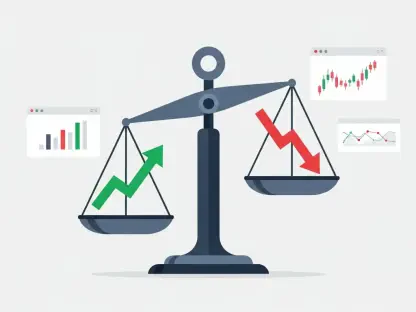Propane dealers are experiencing a digital revolution that has fundamentally altered how businesses operate and interact with consumers. With digital platforms becoming indispensable, these businesses face pressure to adapt swiftly to evolving consumer expectations, characterized by demands for speed, convenience, and accessibility. This transformation began with the initial advent of the World Wide Web and has expanded with each new technological breakthrough, such as smartphone innovations. Consequently, propane dealers must now embrace a variety of digital tools intended to enhance customer experiences and streamline operational processes, ensuring they stay competitive in an increasingly digital world.
The Rise of Digital Technology in Business
The Impact of the Internet and Mobile Devices
The inception of the World Wide Web marked a pivotal moment for businesses across various industries, including the propane sector, reshaping consumer interactions by offering unprecedented access to information and services. This evolution continued with the introduction of smartphones, epitomized by devices like the iPhone, which facilitated seamless and continuous connectivity. For propane dealers, this technological shift meant no longer being constrained by traditional communication channels, such as phone calls or in-person visits. Customers now expect consistent, immediate service accessible from the palm of their hands, which significantly influences how dealers structure their customer service models.
Digital accessibility has driven significant changes, compelling industries to innovate rapidly to meet the high expectations set by consumers accustomed to technology at their fingertips. The fuel industry, historically reliant on personal touchpoints, found itself at a digital crossroads where maintaining customer loyalty depended on embracing digital interfaces that provide swift, efficient, and reliable service. As digital technology continues to progress, those who leverage these advancements will likely lead the market in terms of customer retention and satisfaction.
Consumer Behavior and Expectations
In an era where technology is deeply woven into the fabric of daily life, consumers expect every business to provide quick and efficient solutions to their needs. This expectation extends to propane dealers, who face increasing pressure to deliver seamless and intuitive customer experiences. The modern consumer no longer desires lengthy waits or cumbersome service processes; instead, they favor engagements that prioritize their time and convenience. Such expectations compel businesses to innovate continuously, integrating digital tools that streamline interactions and enhance service delivery.
These changes in consumer behavior necessitate a shift in how propane dealers operate. Dealers are increasingly required to meet these demands by adopting technologies that offer streamlined service through digital portals, mobile apps, and automated systems. Such innovations not only enhance customer satisfaction but also provide businesses with the ability to gather insights into consumer preferences, enabling them to offer more personalized and responsive services. The businesses that succeed in integrating these systems position themselves as leaders, able to swiftly adapt to ever-evolving consumer needs and technological landscapes.
Essential Digital Tools for Propane Dealers
Enhancing Customer Engagement
Digital platforms have become vital for propane dealers aiming to boost customer engagement and foster lasting relationships. By integrating websites and mobile apps, dealers provide customers with self-service options enabling them to manage accounts, order deliveries, and make payments with greater ease and autonomy. These conveniences empower customers while also alleviating pressure on support teams, who can then focus on more complex issues that require personal attention. The result is a more efficient operational model that satisfies consumers’ preferences for quick, effortless transactions and communications.
Implementing these platforms goes beyond simply providing convenience; they enhance the customer experience by offering transparency and accessibility. Customers can access their account information around the clock, eliminating the traditional barriers of office hours and phone lines. This self-service approach builds trust and loyalty, as customers feel more in control of their interactions with the business. By advancing to digital tools, propane dealers not only meet consumer expectations but also differentiate themselves from competitors still reliant on older, more manual systems.
Streamlining Operational Efficiency
The integration of Enterprise Resource Planning (ERP) systems has become a cornerstone for propane dealers looking to streamline their operations and optimize resource utilization. These systems enable automated data processing, minimizing manual input errors and enhancing the accuracy and efficiency of business processes. By offering a holistic view of operations, ERP systems facilitate informed decision-making and strategic planning, essential for dealers aiming to maintain competitiveness in an increasingly data-driven industry.
Propane businesses benefit from ERP systems through improvements in inventory management, scheduling, and financial reporting. These systems provide real-time insights into inventory levels, allowing dealers to anticipate demand changes and optimize delivery routes. The automation of repetitive tasks, such as billing and customer invoicing, reduces costs and the potential for human error. Digital transformation through ERP systems not only enhances operational efficiency but also supports the broader strategic goals of customer satisfaction and profitability.
Automation and Self-Service Trends
The Role of Automated Systems
The shift towards automation is increasingly evident in the operations of propane dealers as businesses seek to improve efficiency and lessen the burden of human error. Automated billing and scheduled payment processes have emerged as crucial components of this trend, offering customers enhanced convenience while ensuring timely transactions for businesses. By employing systems that handle these recurring tasks, dealers can focus resources on areas with more significant strategic impact, such as customer service or business development.
Automation streamlines routine tasks and can have profound impacts on overall customer experience. With automated scheduling, deliveries can be optimized for efficiency, reducing the risk of service disruptions. For customers, this means greater predictability and less stress in managing their propane needs. Furthermore, by minimizing the need for manual intervention, dealers can achieve higher accuracy levels in service provision, improving customer trust and satisfaction. This integration of automated systems is not merely a technological upgrade but a strategic move that aligns with consumer expectations for reliability and responsiveness.
AI-Powered Customer Service Tools
Artificial intelligence has rapidly transformed customer service by providing 24/7 support through chatbots and virtual assistants, which are becoming increasingly popular within the propane industry. These AI-powered tools deliver immediate, consistent responses to consumer inquiries, addressing common questions and issues without delay. By harnessing AI technology, businesses can offer a level of service that meets the modern consumer’s demand for fast, accessible, and reliable communication channels, fostering an enhanced customer experience.
AI tools serve as a first line of support, handling routine queries and freeing up human agents to address more complex customer needs that require nuanced solutions. This not only streamlines customer service operations but also ensures that customers receive assistance when they need it most, regardless of time constraints. The application of AI in customer service is an ongoing trend that provides propane dealers with a competitive edge, establishing them as forward-thinking enterprises that prioritize customer satisfaction and operational efficiency.
Data-Driven Marketing and Service Enhancement
Leveraging Predictive Analysis
In the propane industry, leveraging smart marketing systems and predictive analysis has become essential for making informed, data-driven decisions that enhance customer service and achieve marketing goals. By analyzing customer data patterns and behaviors, propane dealers can tailor their marketing strategies to meet specific customer needs and preferences, leading to higher engagement and improved conversion rates. Predictive analysis allows businesses to forecast demand and manage resources more effectively, ensuring they are prepared to meet consumer expectations and maintain supply chain efficiency.
Advancements in data analysis tools enable propane dealers to gain deeper insights into customer interactions and preferences, helping to craft more personalized marketing messages and service offerings. With the ability to anticipate customer needs and trends, dealers can design promotions and services that resonate with their target audiences. This strategic use of data not only enhances marketing effectiveness but also strengthens customer relationships by offering relevant, timely solutions that align with consumers’ evolving expectations.
Real-World Applications and Benefits
Practical applications of digital transformation within the propane industry underscore its benefits, highlighting how innovative solutions significantly improve delivery efficiency and customer satisfaction. For instance, optimized routing algorithms can enhance delivery logistics by minimizing travel distances and fuel consumption, leading to both environmental and economic benefits. Such improvements ensure that customers receive timely, reliable service while businesses lower operational costs.
These advancements are part of a broader shift towards using digital innovation to solve traditional challenges. By adopting digital tools, propane dealers can enhance service consistency and reliability, bolstering their reputation and customer loyalty. The tangible results—such as decreased delivery times and increased accuracy in scheduling—demonstrate the undeniable value of investing in digital strategies. Real-world examples within the industry illustrate that embracing technology brings transformative changes that drive long-term success and customer satisfaction.
Security Considerations for Digital Transformation
Proactive Security Management
As propane dealers increasingly adopt digital platforms, the importance of implementing robust security protocols becomes paramount. These measures are essential to safeguarding critical data and operations against cyber threats, which are an inherent risk of digital transformation. Dealers must proactively manage security by employing up-to-date systems, encryptions, and controls to protect sensitive information. This includes regular security audits, updating software, and perhaps most crucially, educating employees about cybersecurity practices.
Utilizing specialist consultations can be an effective strategy for identifying potential vulnerabilities and ensuring that security measures are as robust as possible. As dealers undergo digital transformations, it is vital for them to incorporate comprehensive cybersecurity strategies. These strategies should be integrated from the very beginning, ensuring that security considerations are a core component of any digital upgrade or initiative. Such vigilance in security management helps maintain consumer trust and compliance with regulatory requirements, protecting both company reputation and customer data integrity.
Balancing Innovation and Protection
The move towards integrating new digital technologies brings with it the challenge of balancing innovation with the need for stringent security measures. Propane dealers must navigate this balance carefully to ensure that their systems are both advanced and secure. As they innovate, it is imperative to incorporate secure designs and protocols that prevent unauthorized access and data breaches. This balance requires an ongoing commitment to evaluating new technologies and adopting those that ensure the highest level of security and protection.
Ensuring this balance involves a comprehensive approach, starting from the earliest design stages of technological implementations. Regular audits and updates to the security framework, along with employee training programs, can prevent complacency and keep security measures agile and responsive to new threats. Achieving a balance that allows for robust progression without compromising on security enables propane dealers to confidently expand their digital presence, knowing that their systems are fortified against potential risks. This assurance is critical in establishing trust with consumers, who demand both innovative service and protection of their personal information.
Industry-Wide Adoption and Case Studies
Positive Experiences of Early Adopters
Early adopters of digital tools and platforms within the propane industry have reported substantial improvements in operational efficiency and customer satisfaction. These businesses have successfully integrated technologies such as automated scheduling, AI-driven customer service, and data analytics to transform their service models. One of the key benefits they have experienced is the ability to provide faster, more reliable service, which resonates with customers and strengthens loyalty. These tools enable faster decision-making and improved problem-solving capabilities, enhancing the overall customer experience.
These success stories from early adopters serve as a motivational blueprint for the broader industry. They provide evidence of the tangible benefits that digital transformation can offer, reinforcing the idea that embracing digital tools is a strategic imperative rather than an optional investment. By sharing these positive experiences, early adopters encourage others in the industry to explore similar pathways, showcasing the potential for growth and sustained success in a rapidly evolving marketplace.
The Future of Digital Integration
Propane dealers are navigating a digital revolution that has fundamentally changed how businesses run and engage with their customers. As digital platforms become essential, propane businesses feel the pressure to quickly adjust to the shifting expectations of tech-savvy consumers who now demand fast, convenient, and always-on service. This digital transformation kicked off with the emergence of the World Wide Web and has grown exponentially with each advancement in technology, including significant smartphone innovations.
In response to this tech-driven landscape, propane dealers are integrating a host of digital tools designed to boost the customer experience and enhance operational efficiency. These tools range from online ordering systems and customer service chatbots to inventory management software and mobile apps that allow customers to track deliveries in real-time. By adopting these technologies, propane dealers aim to remain competitive in a marketplace where digital engagement is not just an option, but a necessity.
As they embrace this digital shift, propane businesses are not only looking to meet consumer demands but are also seeking to optimize their operations. The goal is to provide reliable, user-friendly, and efficient services that can attract and retain a broader customer base. In essence, by harnessing the power of digital technology, propane dealers are positioning themselves to thrive in an increasingly digital-centric world.









